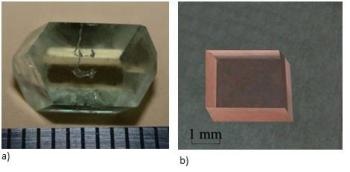Apr 18 2016
A team of the Lomonosov Moscow State University scientists and the Belarusian National Technical University has created a unique laser, which is a compact light source with wavelengths harmless to the human eye. The development can be used in medicine, communications systems and also in research. The works are published in Journal of Crystal Growth and Optics Letters.
 As-grown (Er,Yb):GdAl3(BO3)4 crystal by using high-temperature solution growth on dipped seeds (a). (CREDIT : Nikolay Leonyuk)
As-grown (Er,Yb):GdAl3(BO3)4 crystal by using high-temperature solution growth on dipped seeds (a). (CREDIT : Nikolay Leonyuk)
'In collaboration with our colleagues of the Center for Optical Materials and Technologies, Belarusian National Technical University, we have developed a highly efficientdiode-pumped eye-safe laser, which can be used in ophthalmology, communication systems and ranging', says Nikolay Leonyuk, Professor, Department of Crystallography and Crystal Chemistry, Geological Faculty, the Lomonosov Moscow State University. The development of such laser became possible to the fact that the team of scientists had created a laboratory growth technology of single crystals with desired properties.
The emission with wavelengths of 1500 -- 1600 nm is agreeably safe for the eyes and seems prospective for practical applications in medicine, ranging (determining the distance from the observer to the object), communication systems andoptical location. This feature is explained with, first, the fact that the light-refracting system of the eye (cornea and crystalline lens) have a sufficiently high absorption coefficient in this part of the spectrum, so only a small fraction of the energy reaches the sensitive retina. Second, the radiation in the 1500 -- 1600 nm spectral range suffers low losses passing through the atmosphere, and it makes advantages for their applications in telecoms.
To date, among the sources of radiation in this spectral range, the most widely used are the solid-state lasers based on phosphate glasses co-doped with Er (erbium), and Yb (ytterbium) ions. Such lasers are also relatively simple, compact and capable of operating in adjusted Q-mode required for producing short impulses. In the meantime, the main disadvantage restricting the usage of erbium phosphate glasses in continuous diodesystems is a low thermal conductivity of the matrix. To avoid such limitation, Er and Yb containing crystalline matrixcan be used.
In the issued research, GdAl3 (BO3)4 single crystals co-doped with Er and Yb were used to improve the efficiency of generation pulse energy and repetition rate, and henceto increase the maximal measurement range, reducing errors and time spending. These single crystalsare characterized by a record value of thermal conductivity and high thermochemical stability (decomposition at temperatures of 1280°C, resistant to corrosive environments) as well as mechanical strength.
'The created solid-state laser based on yttrium gadolinium borate crystals (Er,Yb:GdAl3 (BO3)4 is a unique compact source of emission with varying eye-safe wavelengths' says Nikolay Leonyuk. 'Reliable laser design, along with high performance makes it possible to be widely used in laser ranging systems, metrology andlaser-induced breakdown spectroscopy.'
Using of laser diode as a pump source increase the lifetime of laser up to 100 000 hours. The laser system is easy to use and plug and play, it does not require water cooling, as well as does not generate any vibration during laseroperations.
Compared with the widely used CW erbium fiber lasers, the (Er,Yb):GdAl3 (BO3)4-based laser is characterized by linear laser radiation and lower price.